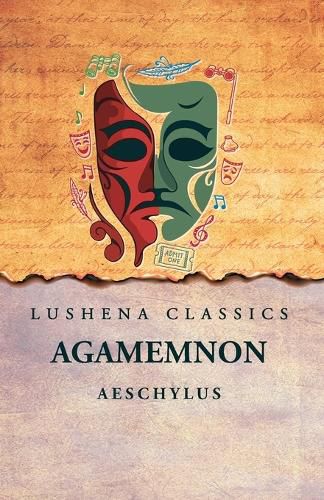Readings Newsletter
Become a Readings Member to make your shopping experience even easier.
Sign in or sign up for free!
You’re not far away from qualifying for FREE standard shipping within Australia
You’ve qualified for FREE standard shipping within Australia
The cart is loading…






This title is printed to order. This book may have been self-published. If so, we cannot guarantee the quality of the content. In the main most books will have gone through the editing process however some may not. We therefore suggest that you be aware of this before ordering this book. If in doubt check either the author or publisher’s details as we are unable to accept any returns unless they are faulty. Please contact us if you have any questions.
Agamemnon is the first play in The Oresteia, a trilogy by Aeschylus, first performed in 458 BCE. The play tells the tragic story of King Agamemnon's return from the Trojan War and his murder at the hands of his wife, Clytemnestra. It explores themes of justice, revenge, fate, and the consequences of past sins.
The play is set against the backdrop of a family curse. Agamemnon's ancestors, the House of Atreus, were marked by betrayal and violence. To ensure success in the Trojan War, Agamemnon sacrificed his daughter Iphigenia to appease the goddess Artemis, which deeply enraged his wife, Clytemnestra.
The play opens with a Watchman on the palace roof in Argos, waiting for news of the war. He sees the signal fires announcing Troy's fall and rejoices, but he hints that trouble is coming.
Clytemnestra, now ruling in Agamemnon's absence, pretends to welcome her husband home with joy. She orders a red carpet (symbolizing blood) to be laid out for Agamemnon, an act of hubris (excessive pride), which makes him uneasy.
Agamemnon arrives with the Trojan princess Cassandra, his war prize and a prophetess cursed by Apollo-she can see the future, but no one believes her. She foresees Agamemnon's murder and her own death but enters the palace knowing she cannot change fate.
Inside the palace, Clytemnestra kills Agamemnon in his bath with an axe. She emerges, proudly justifying her actions, claiming vengeance for Iphigenia. She also kills Cassandra.
Her lover Aegisthus, Agamemnon's cousin, appears, revealing his own vendetta: Agamemnon's father, Atreus, had killed and served Aegisthus' brothers as food. Now, Aegisthus and Clytemnestra seize power in Argos.
Clytemnestra is one of Greek tragedy's most powerful female characters. Unlike passive tragic heroines, she is intelligent, politically shrewd, and ruthlessly determined. While she seeks justice for Iphigenia, her actions lead to more bloodshed, setting the stage for the next play, The Libation Bearers, where her son, Orestes, seeks vengeance for Agamemnon's murder.
$9.00 standard shipping within Australia
FREE standard shipping within Australia for orders over $100.00
Express & International shipping calculated at checkout
This title is printed to order. This book may have been self-published. If so, we cannot guarantee the quality of the content. In the main most books will have gone through the editing process however some may not. We therefore suggest that you be aware of this before ordering this book. If in doubt check either the author or publisher’s details as we are unable to accept any returns unless they are faulty. Please contact us if you have any questions.
Agamemnon is the first play in The Oresteia, a trilogy by Aeschylus, first performed in 458 BCE. The play tells the tragic story of King Agamemnon's return from the Trojan War and his murder at the hands of his wife, Clytemnestra. It explores themes of justice, revenge, fate, and the consequences of past sins.
The play is set against the backdrop of a family curse. Agamemnon's ancestors, the House of Atreus, were marked by betrayal and violence. To ensure success in the Trojan War, Agamemnon sacrificed his daughter Iphigenia to appease the goddess Artemis, which deeply enraged his wife, Clytemnestra.
The play opens with a Watchman on the palace roof in Argos, waiting for news of the war. He sees the signal fires announcing Troy's fall and rejoices, but he hints that trouble is coming.
Clytemnestra, now ruling in Agamemnon's absence, pretends to welcome her husband home with joy. She orders a red carpet (symbolizing blood) to be laid out for Agamemnon, an act of hubris (excessive pride), which makes him uneasy.
Agamemnon arrives with the Trojan princess Cassandra, his war prize and a prophetess cursed by Apollo-she can see the future, but no one believes her. She foresees Agamemnon's murder and her own death but enters the palace knowing she cannot change fate.
Inside the palace, Clytemnestra kills Agamemnon in his bath with an axe. She emerges, proudly justifying her actions, claiming vengeance for Iphigenia. She also kills Cassandra.
Her lover Aegisthus, Agamemnon's cousin, appears, revealing his own vendetta: Agamemnon's father, Atreus, had killed and served Aegisthus' brothers as food. Now, Aegisthus and Clytemnestra seize power in Argos.
Clytemnestra is one of Greek tragedy's most powerful female characters. Unlike passive tragic heroines, she is intelligent, politically shrewd, and ruthlessly determined. While she seeks justice for Iphigenia, her actions lead to more bloodshed, setting the stage for the next play, The Libation Bearers, where her son, Orestes, seeks vengeance for Agamemnon's murder.